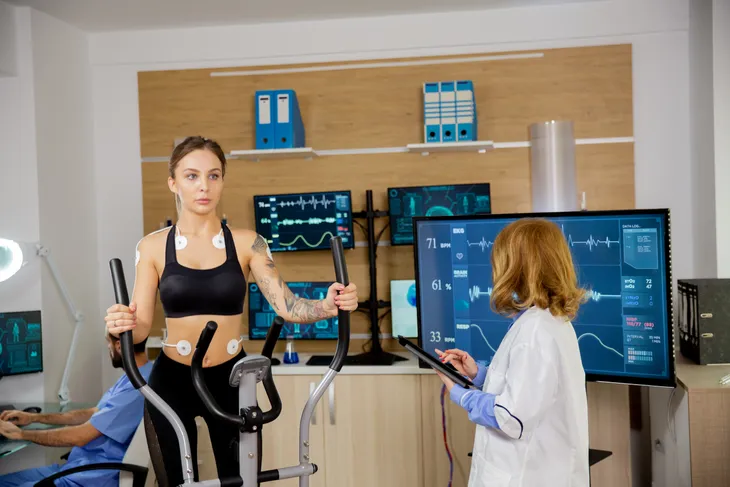- Health screenings for athletes are a systematic way to evaluate an athlete’s general and sport-specific health and fitness.
- Regular athlete health screenings can provide benefits such as detecting training risks, identifying imbalances and weaknesses, and creating individualized training plans.
- From lab work to mental health, athlete health checks involve a wide variety of tests and exams.
Regardless of how fit or fast you are, your pre-season or pre-activity preparation should include health screenings. Similarly to a high-performance sports car, performing regular checks and maintenance can help ensure you have a sustainable and successful athletic career for years to come.
Athlete health screenings consist of a variety of exams and tests. Read on to learn everything about what to expect for health screenings.
What Is an Athlete Health Screening?
Athlete health screenings are a systematic approach to identifying and addressing athletes’ physical readiness. This often includes thorough medical tests and screenings as well as physical strength and fitness evaluations. Introductory-level athletes may complete more broad testing, while advanced athletes may require individualized testing and screening.
The purpose of these tests is to identify any health issues that may affect athletic performance, training risks, or long-term health risks. Athlete health screenings generally take place about 6-weeks before activities begin to allow for adequate time to address concerns. Screenings may include:
- Routine medical screenings and tests
- Strength and fitness assessments
- Extra lab tests
- Movement testing
- Nutrition
- Body mass index (BMI)
The Importance of Athlete Health Screenings
Regardless of age group or competitive level, all athletes should have health screenings. Studies show that in addition to improving athletic performance, pre-participation evaluation (PPE) can help detect serious conditions and offer strategies to prevent health issues or injuries.
The potential benefits of health screening for athletes include:
- Identify performance strengths, weaknesses, and training targets
- Screen for acute training health concerns such as asthma or diabetes
- Detect future health risks
- Establish health and performance baselines
- Inform training plans and intensity
- Provide athletes with training education, motivation, and incentive
- Gauge the effectiveness of training programs
Medical History
As part of PPE, physicians take athletes’ medical history, covering areas such as past injuries, exercise-induced conditions, blood pressure, heart murmur, chest pain, or fatigue. In addition to information regarding allergies, immunization status, and medication, a medical history includes questions about your family history regarding issues such as cardiac conditions, premature morbidity, cancer, or mental health.
If you’re an athlete younger than 18, you may need a parent or guardian present to provide a detailed medical and family history. This evaluation helps physicians better understand your current health and identify potential risk factors.
Routine Lab Tests
Most PPEs include basic lab and blood tests that help physicians establish an athlete’s baseline and inform assessments and treatment plans. Common lab tests include:
- Urine analysis
- Full blood count
- Iron panel
- Blood glucose level
- Lipid profile
- Vitamin D
- Chemistry panel
Other tests may apply, such as those relating to female athletes’ menstrual cycles or reviews of current medications. You may need to undergo other relevant routine tests if you have pre-existing conditions such as diabetes or anemia.
Physical Examination
Athlete health screenings should include an overall health screen and physical examination to assess general health and any issues uncovered during the medical history evaluation and lab tests. Physical exams include the following screenings:
- Vital signs
- Height
- Weight
- Body composition
- Vision testing
- Abdominal
- Skin
- Blood pressure
- Digestive system
- Musculoskeletal assessment
- Cardiovascular assessment
Some of these exams can be easily completed in a physician’s office, but others may require more extensive testing, imaging, or lab work.
Cardiovascular Screening
Cardiovascular screening looks for any lung or heart problems that may affect your performance or health. Using questionnaires, physical tests or electrocardiograms, and other imaging methods, these tests screen for potential issues such as:
- Marfan syndrome
- Blood pressure
- Heart murmurs
- Femoral pulses
- Heart auscultation
- High cholesterol
A strong, healthy heart isn’t only crucial for high performance and hard exercise; some activities can also trigger serious heart conditions in athletes. It’s important and sometimes required by sports governing bodies to screen for these risks before you may participate in activities.
Musculoskeletal Screening
Many sports cause significant stress to bones, joints, muscles, tendons, and ligaments, all of which together make up the musculoskeletal system. For issues ranging from a tight muscle to poor mobility, athlete-specific musculoskeletal screenings evaluate your injury history and identify injury predispositions based on your health and your sport. These screenings can help develop training plans to address weaknesses or imbalances and reduce the rate of acute or chronic injuries.
Musculoskeletal screenings may assess:
- Range of motion
- Muscular symmetry
- Muscular strength
- Posture
- Balance and coordination
- Movement patterns
- Trunk control
Neurological Screening
Neurological screenings consider various aspects of neurological health, such as:
- Spinal cord injuries
- Concussions
- Seizure disorders
- Anxiety
- Depression
- Attention deficit disorder
- Migraines or chronic headaches
You may benefit from a more in-depth neurological screening if you have pre-existing neurological conditions, but most screenings include evaluations of neurocognitive and visual abilities, brain network activation tests, and concussion exams. These tests are especially important if you participate in a sport with a greater risk of concussions or spinal cord injuries.
Nutrition
Since nutrition is a cornerstone for powering athletes, a thorough nutrition assessment is an important step in ensuring long-term athletic health and success. In a typical clinical setting, physicians examine your eyes, skin, muscles, joints, and other areas for signs of nutrient deficiency and collect information on overall well-being, appetite, and gastrointestinal health.
Physicians may evaluate what you eat over a specific period or ordinary day and quantify information such as total calories, macronutrients, micronutrients, and overall diet quality relating to timing or healthfulness. Biomedical screenings can also provide an objective assessment of your nutrition intake or deficiencies.
BMI
BMI is a measurement of your weight divided by your height. This tool helps physicians roughly determine whether you are in a healthy weight range or have a BMI between 18.5 and 24.9. However, BMI has limitations as athletes typically have greater musculature and may have a wider range.
Body composition tests, which measure body fat percentage, bone density, and lean muscle mass, can provide more specific insight into your health. For instance, beyond having more muscle than the average individual, male athletes typically have a lower body fat percentage than female athletes. Professionals perform body composition tests using methods such as body calipers, DEXA scans, and underwater weighing.
Athletic Abilities
Successful athletes often possess well-rounded athleticism and fitness. A variety of athletic evaluations can help determine your overall physical readiness and fitness and give insight into training needs. Common testing areas include:
- Aerobic: The ability to sustain dynamic efforts over high intensities or extended periods.
- Anaerobic: The ability to perform explosive and high-intensity dynamic efforts powered by the anaerobic system.
- Power: The ability to contract or resist force as fast as possible.
- Speed: The ability to move rapidly over a short duration.
- Flexibility: The ability to move within various baseline ranges of motion.
- Maximum strength: The highest level of force generated during a maximal muscle contraction.
Tips for Optimizing Health Screenings for Athletes
To get the most from your health and fitness screenings, consider these strategies:
- Relevance: Undergo exams or evaluations relevant to your sport, its demands, and your personal health.
- Standardized: Your exams should be standardized and easily repeated to establish baselines and ensure accuracy.
- Suitability: Tests should be scaled to your individual athletic abilities.
- Frequency: Most professionals recommend that you complete health screening every 2- or 3-years and 6-weeks before sports or training begin.















